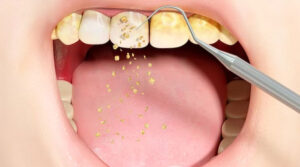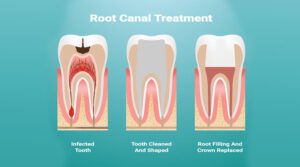Our mouth is full of bacteria and it forms sticky plaque on teeth by constant exposure to mucus and other particles. If left untreated it can harden and form tartar. This can be cleaned only by dentist; brushing and flossing won’t help. This gives rise to poor oral hygiene. Gum disease may not show symptoms soon and they develop without any pain. There are certain symptoms which occur when you have gum disease.
The symptoms of gum disease include
- Red, Swollen and Tender gums
- Receding gums
- Bleeding gums while brushing
- Constant bad breath and bad taste in mouth
- Formation of deep pockets between teeth and gums
- Loose teeth
You might be infected by gum disease even if your mouth doesn’t show any symptoms. In some cases gum disease only affect certain teeth. Only a dentist can understand its progression.
Following are the ways how dentist can diagnose gum disease:
When you visit a dentist for diagnosis he checks for,
- Bleeding gums, firmness, swelling and pocket depth. Pocket depth is the space between the gum and tooth. If the pocket is larger and deeper, the disease is more severe.
- Teeth sensitivity and teeth movement
- Alignment of teeth
- Jawbone to detect the breakdown of bone surrounding your teeth.
Treatment for gum disease
The main way to treat gum disease is by reducing the swelling, promoting attachment of healthy gums, reducing the depth of pockets, risk of infections and stopping the progression of disease. The stage of disease determines the options for treatment. Your dentist will also check the response of your earlier treatment and overall health. Treatment can be done in various ways. The options range from non surgical therapies that control the growth of bacteria to surgery that restores the supportive tissues.
Prevention of gum disease
It is not impossible to treat gum disease. It can be treated in all the cases if the person learns to control the development of plaque. To control plaque you need to practise good oral hygiene. This includes brushing your teeth twice a day and flossing once daily. Brushing and flossing helps preventing the growth of plaque in a great way. You can also use antibacterial mouth rinse which helps in preventing the development of bacteria. Visiting your dentist twice a year is also recommended. Dentist not only cleans your teeth but also gives you advice for dental care.





